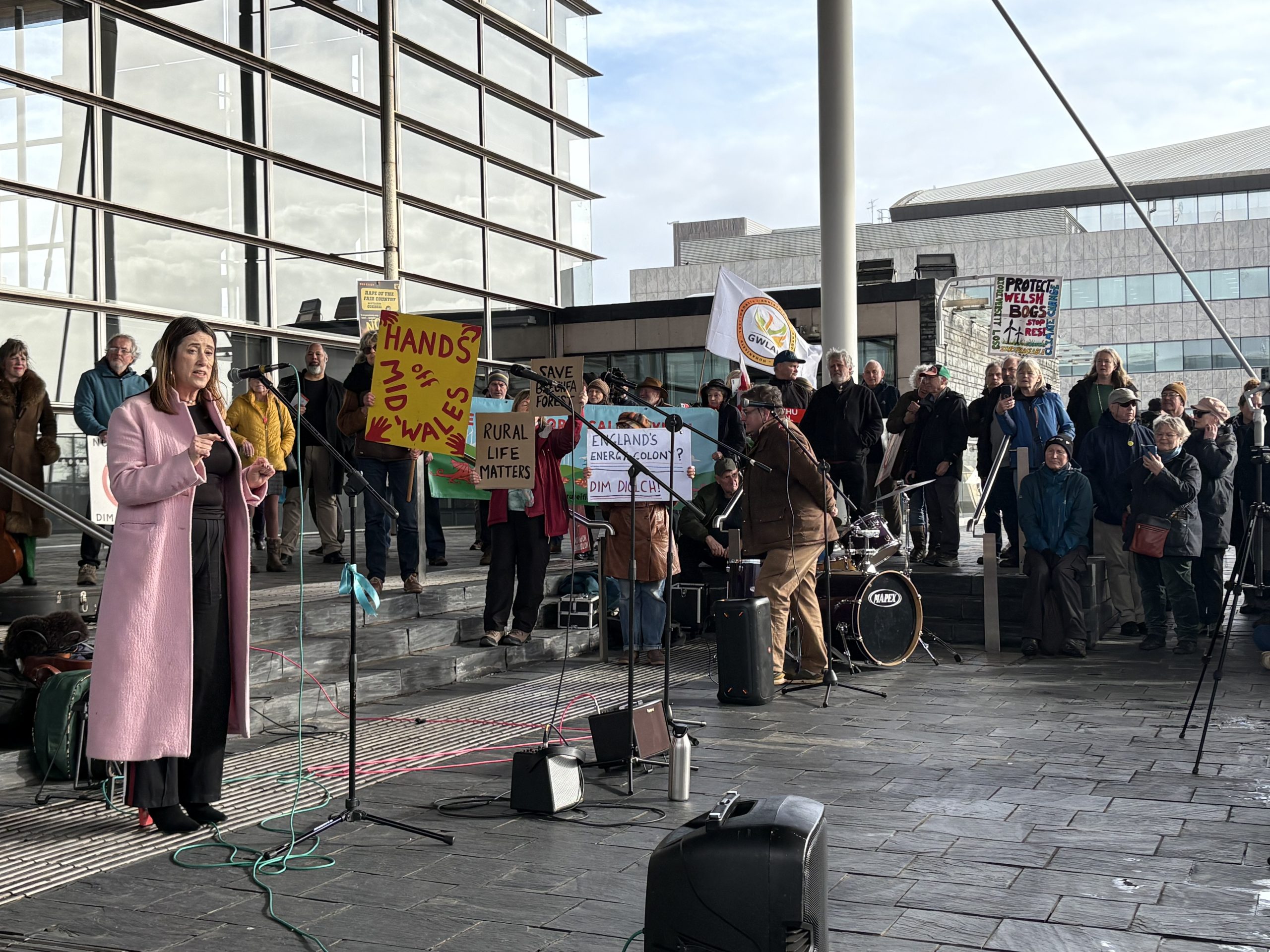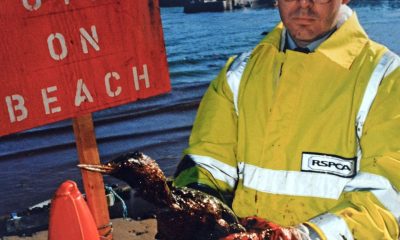News
Shocking puppy farm scandal exposed

A SHOCKING BBC Wales documentary screened on Monday night (Sept 30) laid bare the extent of the puppy farming scandal in West Wales.
This newspaper has repeatedly reported on the cruelty of puppy farming and the Lucy’s Law campaign and is not surprised by the content of the BBC Wales Investigates programme, anchored by Wyre Davies.
With the resources at its disposal, BBC Wales was able to dig deeper into links between breeders, vets, and how licensed premises are permitted to keep open despite serious animal welfare issues.
SYSTEMIC FAILURES IN ANIMAL WELFARE
One veterinary practises, Towy Vets of Carmarthen, was shown to have listed a dog as fit for breeding even though it also recorded it as dead. Animals as young as three months old were also shown as ready for breeding.
A breeder based in Carmarthenshire, Alun Douch, alleged that he had administered the parvo-virus vaccine to animals himself, having bought it from Towy Vets.
The Royal College of Veterinary Surgeon rules provides that a dog can only be vaccinated after a medical inspection by a qualified vet.
The medical records for the parvo vaccine’s administration must have been lacking as Mr Douch later sold a puppy to a Swansea woman which had to be destroyed because it suffered from the highly contagious and lethal disease.
When the dog’s buyer contacted the breeder, Alun Douch of Tywi Vale, Nantgaredig, she alleged that Mr Douch offered to administer antibiotics to the animal.
A Council inspection document revealed that there was an ongoing problem with parvo-virus at Mr Douch’s breeding establishment.
The same document-related that an inspector had seen Mr Douch kick a dog during the inspection.
Mr Douch continued holding a licence in spite of that incident.
In a statement to the BBC, solicitors acting for Mr Douch denied ‘any cruelty to any animal’.
An expert panel assembled by the BBC which examined the cases used in the programme expressed serious concerns about animal health and welfare and questioned the rigour of the inspection regime and enforcement.
The BBC report that a senior vet – Mike Jessop – who is brought in by local authorities to advise on welfare issues, told the broadcaster there were clear examples where some professional colleagues have been “found wanting”.
He said he would be making a referral to the Royal College of Veterinary Surgeons regarding the evidence in the programme.
In a statement on its website, Towy Vets said: ‘In relation to the BBC Wales Investigates television programme broadcast on 30th September 2019, a specific health report given to a Carmarthenshire licensed breeder was referenced. We are unfortunately unable to discuss client cases and share any of the background detail to the referenced report, and handwritten notes on that report.
‘Towy Vets passionately believe that breeding should be done within strict animal welfare guidelines and expect our vets to follow the RCVS code of conduct. We would welcome further dialogue with Carmarthenshire Council on the regulation of breeding.’
MP CALLS FOR DECISIVE ACTION
In 2018, Carmarthenshire became one of the first local authorities in Wales to adopt Lucy’s Law.
Lucy’s Law aims to ban third-party puppy and kitten sales, ensuring stronger protections for animals.
However, the problem in West Wales appears to be not only with unlicensed breeders but also with the activities of licensed ones.
Jonathan Edwards MP, who wrote to the Labour Welsh Government to address the poor animal welfare issues raised on the programme, developed that point.
Carmarthen East and Dinefwr MP, Jonathan Edwards said: “My constituents are very concerned that this remains an ongoing issue in Wales. It is my understanding that these terrible events took place on licensed premises. It appears that licences have been issued to people who do not have the welfare of these dogs at heart.
I have written to the Welsh Government to press them for immediate, decisive action to stop these farms from operating in such a terrible manner. An investigation is also required for these unscrupulous activities. It seems clear to me that the current regulations under this government are inadequate.”
AM QUESTIONS ‘FAILING’ SYSTEM
Mid and West Regional Labour AM Joyce Watson raised the harrowing programme in First Minister’s Questions in the Senedd.
Ms Watson commended the BBC for showing ‘cruelty beyond belief in council-registered puppy farms’.
The AM continued: “It showed hundreds of dogs living in filthy, dark, damp and cold conditions. These premises are inspected annually by inspectors and vets, people who are supposed to prioritise the welfare of the animals.
A number of premises have been inspected and found wanting, with breaches concerning poor animal welfare logged by inspectors and vets.
This wasn’t a one-off, they had consistently failed to meet recommendations and had been issued with warnings. Despite this, no action was taken against the breeders and licences were reissued year on year.
In some instances, not even basic needs were being met, such as in one site near Llandysul that featured in the programme.”
In that case, a dog was given to undercover workers from a rescue charity. After a vet inspected the animal, a dead puppy was found undelivered and emergency surgery needed to save the animal’s life.
Joyce Watson continued: “The legislation that is in place to protect these dogs is failing. The sheer volume of upheld complaints suggests that something is radically wrong in this process. Minister, I’d like to know what immediate action the Welsh Government are taking, in light of this report, to protect the welfare of both the puppies and the adult dogs at the puppy farms featured in this programme. And it’s clear to me, from the response that I’ve had swiftly overnight, that these authorities are overwhelmed.”
Responding on the Welsh Government’s behalf, Trefynydd Rebecca Evans told AMs she and other AMs shared Joyce Watson’s horror at the programme’s content.
Ms Evans said: The Minister for Environment and Rural Affairs [Lesley Griffiths AM] has written — or intends to very shortly — to veterinary bodies, and also to local authorities about this specific issue. She’s meeting with the chief veterinary officer tomorrow (Wednesday, Oct 2). But I also know that the Minister intends to ask the animal welfare framework group to revisit the current breeding regulations to improve welfare conditions at breeding establishments.”
TIME IS THE KILLER
How long that will take is anybody’s guess, in the meantime animals are still suffering in both licensed and unlicensed puppy farms in Carmarthenshire and elsewhere.
An illustration of the current regulatory regime’s shortcomings is shown by the case of Sylvia Griffiths, the owner of Glenview Kennels in Llandyfaelog, who continued to breed and sell puppies despite being refused a licence by Carmarthenshire County Council.
Griffiths held a breeding licence for Glenview since 1998, originally granted for up to 23 adult dogs.
However, when she applied to renew her licence in July 2016, animal health officers visited and found 74 adult dogs on the premises in overcrowded conditions with no free access to exercise areas.
Despite being given time to address conditions and warned that a failure to bring about necessary improvements to animal welfare, when council officers returned to her premises in December 2016 they found that conditions had not improved sufficiently to permit Griffiths to continue holding a licence.
Notwithstanding the officers’ findings, Griffiths continued to defy the law and breed dogs for sale.
It took a complaint from a concerned customer in May 2017, however, for the Council to take further action.
It was over a year later, on July 20, 2018, that Griffiths was ordered to pay £13,500 in fines and costs for continuing to breed and sell puppies illegally.
Charity
Christmas jumper day fundraiser helps support lifesaving volunteer service

A WEST WALES charity that delivers blood, medication and urgent medical supplies for the NHS has received a welcome funding boost thanks to the generosity of local driving examiners and instructors.
Blood Bikes Wales has thanked the West Wales Driving Examiners for raising money through a festive Christmas Jumper Day, with additional contributions from Approved Driving Instructors and staff from the Driver and Vehicle Standards Agency.
The fundraising effort has resulted in a sizeable donation that the charity says will go directly towards keeping its volunteer-run service on the road.
Blood Bikes Wales provides a free out-of-hours courier service for the NHS, transporting blood, samples, donor breast milk, medication and other urgent items between hospitals and healthcare sites. The service helps reduce costs for the health service while ensuring patients receive time-critical treatment as quickly as possible.
Mark, the charity’s West Area Representative, accepted the cheque on behalf of the organisation at a small presentation outside the local driving test centre.
A spokesperson for Blood Bikes Wales said the support would “go a long way in helping us continue supporting NHS services and patients across the region”.
They added: “We’re truly grateful for the generosity and community spirit shown by the West Wales Driving Examiners, local ADIs and DVSA staff. Every donation helps keep our bikes fuelled, maintained and ready to respond when the NHS calls.”
The group added a light-hearted note about the day, joking that while there may not have been an official “pass mark” for festive knitwear, the examiners would certainly have earned top marks.
Blood Bikes Wales is powered entirely by volunteers, who give up their time to carry out thousands of deliveries each year, often late at night and in poor weather conditions.
Anyone interested in supporting the charity, either through donations or volunteering, can find more information on the Blood Bikes Wales website.
News
Protest at Senedd as climate groups clash on how Wales should go green

Campaigners demand landscape protection and underground cables while environmentalists warn Wales cannot slow the clean energy transition
A PROTEST took place outside Senedd Cymru on Wednesday (Feb 11) as campaigners gathered to oppose large-scale wind farms, energy parks and new overhead pylons across rural Wales.
Residents from mid and west Wales, including farming families, countryside groups and community activists, assembled on the steps of the Welsh Parliament holding banners reading “Hands off Mid Wales”, “Rural life matters” and “Protect Welsh bogs”.

Many said they support renewable energy in principle but fear that current proposals would industrialise rural landscapes while delivering little benefit to local people.
Among those addressing the crowd was Jane Dodds, leader of the Welsh Liberal Democrats, who renewed calls for ministers to require electricity cables to be placed underground rather than carried on new lines of pylons.

Calls for underground cables
Dodds said Wales must not lose its countryside in the rush to decarbonise.
“We cannot afford to lose our countryside,” she told protesters. “Once these wind turbines and pylons are in place, the impact on our landscapes will be long lasting and, in many cases, irreversible.
“Local people feel their concerns are being overlooked while large developers push ahead with major projects. That is not how the transition to green energy should work.”
She pointed to a recent budget agreement which secured £1 million for a Visual Impact Innovation Fund to trial undergrounding technologies and explore alternatives to overhead infrastructure in sensitive areas.
“We need a balanced approach,” she said. “We must move away from fossil fuels, but we must also protect the beauty and character of rural Wales.”
Why people are protesting
Speakers and attendees raised concerns about:
• visual impact of turbines and pylons on open countryside
• effects on peatland, wildlife and habitats
• loss of productive farmland
• heavy construction traffic through small villages
• profits flowing to distant shareholders rather than host communities
Several campaigners argued that decisions feel “done to” communities rather than shaped with them, with limited consultation and little long-term return.
Some called for smaller-scale, locally owned schemes instead of what they described as “mega-projects”.
Climate groups defend renewables
In response to the protest, Climate Cymru said Wales must not step back from wind power and other renewables, warning that continued reliance on fossil fuels would worsen both the climate and cost-of-living crises.
Stan Townsend, spokesperson for the group, said: “Rising energy bills and energy insecurity are already affecting families, farmers and businesses across the country.
“Turning away from renewables would mean deeper dependence on volatile, expensive, polluting fossil fuels. We need clean, home-grown energy to protect people and the planet.”
He said Wales has some of the best wind resources in Europe and a major opportunity to cut bills, create skilled jobs and strengthen energy security.
Community ownership ‘key to support’
Community Energy Wales said many objections could be eased if local people had ownership or a financial stake in developments.
Leanne Wood, co-executive director, said: “If communities can part own developments, many of the objections to new wind turbines can be overcome. Ownership brings control.
“This would lock the profits into those communities and potentially reduce bills.”
The organisation is working to enable locally generated renewable electricity to be sold directly to local consumers so that wealth stays within towns and villages.
A wider debate
The demonstration highlights a growing divide over how Wales meets its net zero targets.
While environmental groups stress the urgent need to expand renewable energy quickly, rural campaigners say the Wales-wide push must not come at the expense of landscapes, farming and community consent.
Dodds urged the Welsh Government to strengthen planning, consultation and benefit schemes so that communities see clear advantages.
For many at the Senedd, the message was clear: renewable energy is necessary — but only if local people share the control, the profits and the decisions.
News
West Wales Together Alliance launch in Haverfordwest

A NEW alliance bringing together community groups, trade unions, faith leaders and campaigners from across west Wales is set to launch in Haverfordwest next month.
The West Wales branch of the Together Alliance will officially begin with a public meeting at 7:00pm on Wednesday (Feb 18) at Haverfordwest Mosque, Cherry Grove.
Organisers say the event will unite local politicians, farmers, artists, anti-racist organisations and faith groups in response to what they describe as growing “voices of division” in national and local politics.
In a statement, the alliance said: “Those who preach division are becoming more confident. Their false promises seize on very real economic problems and scapegoat migrants, Muslims and refugees.
“But we can change things together. The voices of unity can grow stronger. Strength lies in solidarity and working together for hope, not despair.”
The group aims to build cooperation between communities and challenge racism and extremism through grassroots organising. It says hundreds of organisations and individuals nationwide have already signed up.
The Haverfordwest launch forms part of a wider mobilisation ahead of a major national demonstration planned for London on March 28.
Several high-profile supporters have also backed the campaign, including comedian and campaigner Lenny Henry, who said: “We stand for love over hate, hope over fear and unity over division. We’re coming together against racism.”
Singer Paloma Faith added: “There is no world that I want to live in where discrimination is acceptable for anything.”
Organisers say anyone interested in promoting inclusion, equality and community solidarity is welcome to attend.

-

 Health6 days ago
Health6 days agoHealth board targets rise in steroid and gym drug use across west Wales
-

 Crime6 days ago
Crime6 days agoTeacher injured and teenager arrested for attempted murder at Milford Haven School
-

 Business2 days ago
Business2 days agoComputer Solutions Wales under fire from customers
-

 Business5 days ago
Business5 days agoSix-figure negligence victory leaves retired builder trapped in divorce limbo
-

 Health8 hours ago
Health8 hours agoHealth Board to decide future of nine key services at two-day meeting
-

 Sport6 days ago
Sport6 days agoWales name squad for Six Nations opener against England
-

 News6 days ago
News6 days agoReform appoints Dan Thomas to lead party in Wales
-

 News6 days ago
News6 days agoAnother Senedd member defects to Reform as Lib Dem MP hits out




























